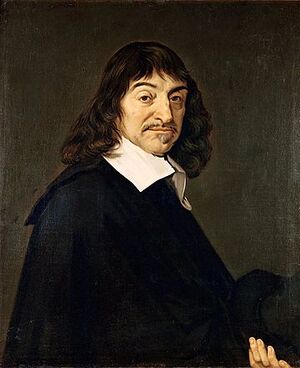René Descartes (nonfiction)
René Descartes (31 March 1596 – 11 February 1650) was a French philosopher, mathematician, and scientist.
Dubbed the father of modern western philosophy, much of subsequent Western philosophy is a response to his writings, which are studied closely to this day. He spent about 20 years of his life in the Dutch Republic.
Descartes's Meditations on First Philosophy continues to be a standard text at most university philosophy departments.
Descartes's influence in mathematics is equally apparent; the Cartesian coordinate system—allowing reference to a point in space as a set of numbers, and allowing algebraic equations to be expressed as geometric shapes in a two- or three-dimensional coordinate system (and conversely, shapes to be described as equations)—was named after him. He is credited as the father of analytical geometry, the bridge between algebra and geometry, used in the discovery of infinitesimal calculus and analysis.
Descartes was also one of the key figures in the scientific revolution.
Descartes refused to accept the authority of previous philosophers. He frequently set his views apart from those of his predecessors.
In the News
Pierre Gassendi and René Descartes clash over the possibility of certain knowledge.
Fiction cross-reference
Nonfiction cross-reference
External links:
- René Descartes @ Wikipedia

